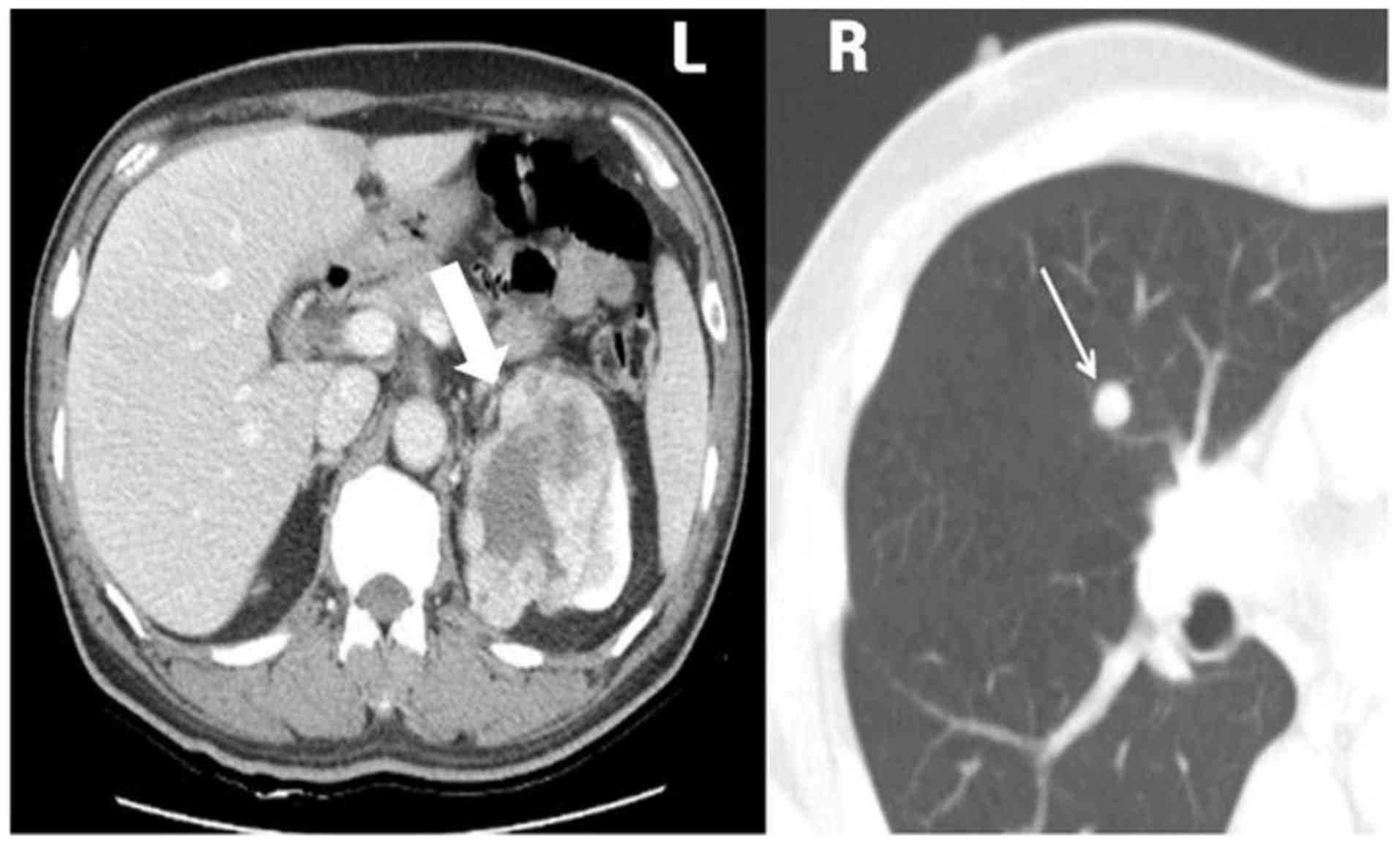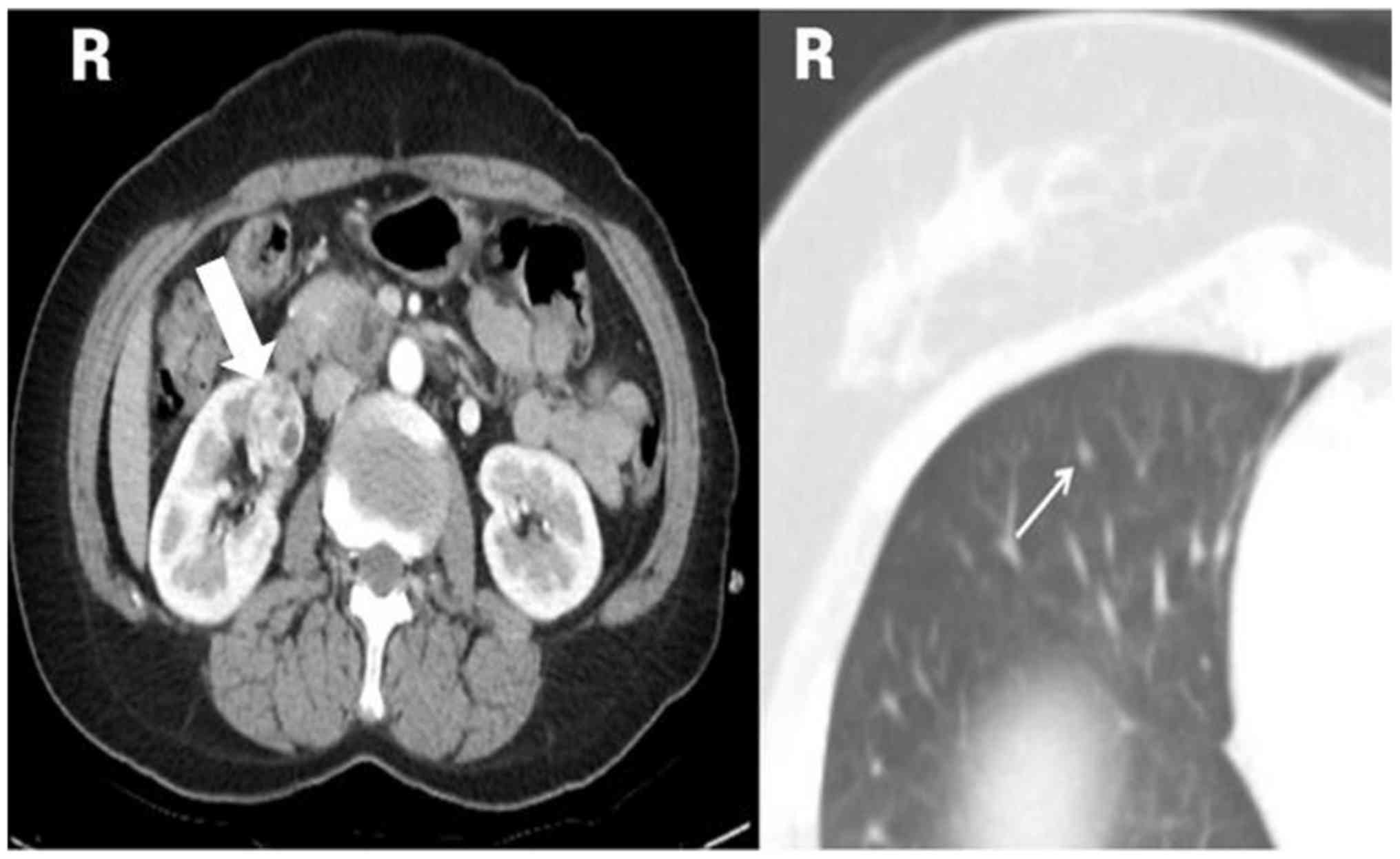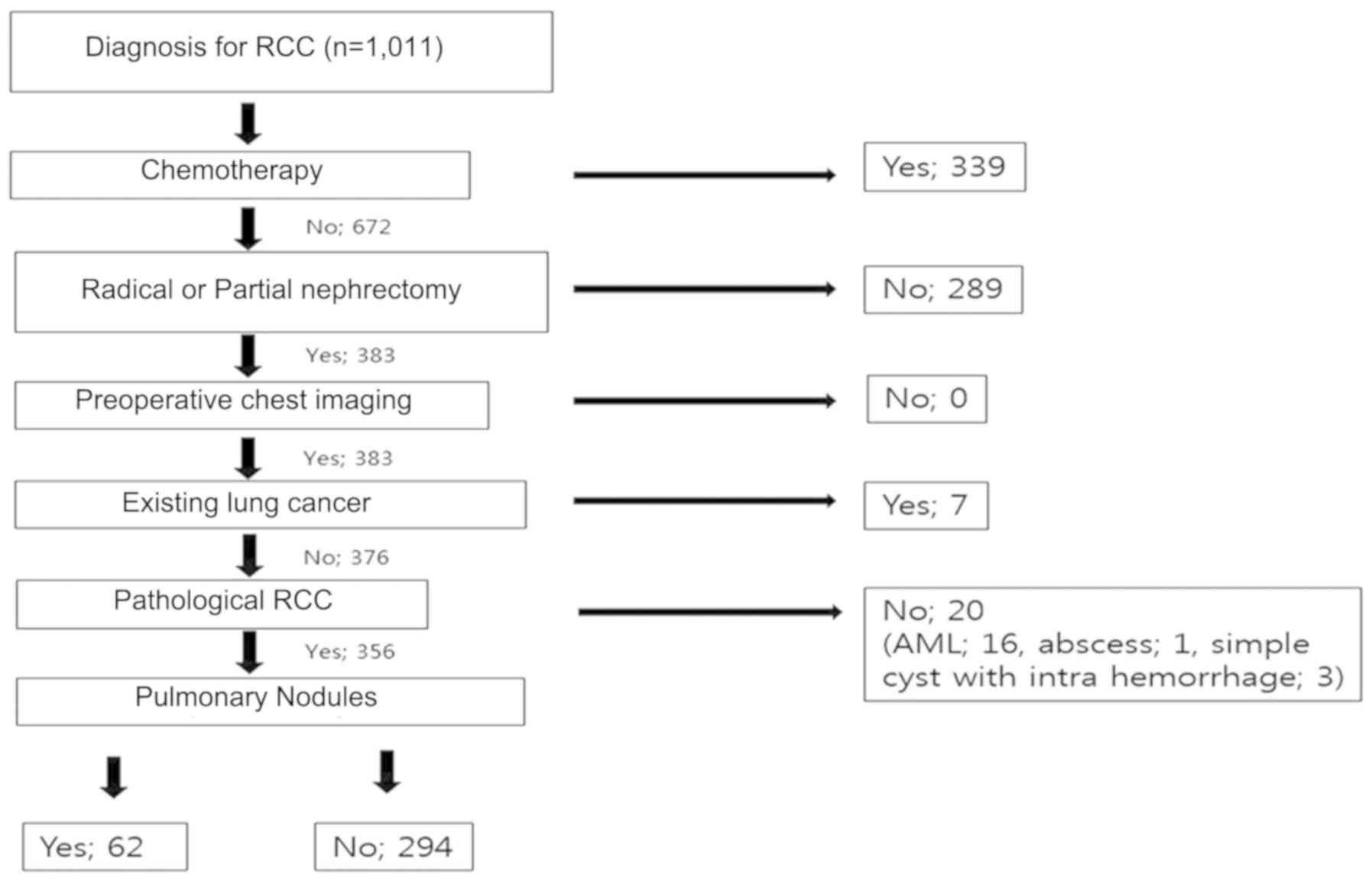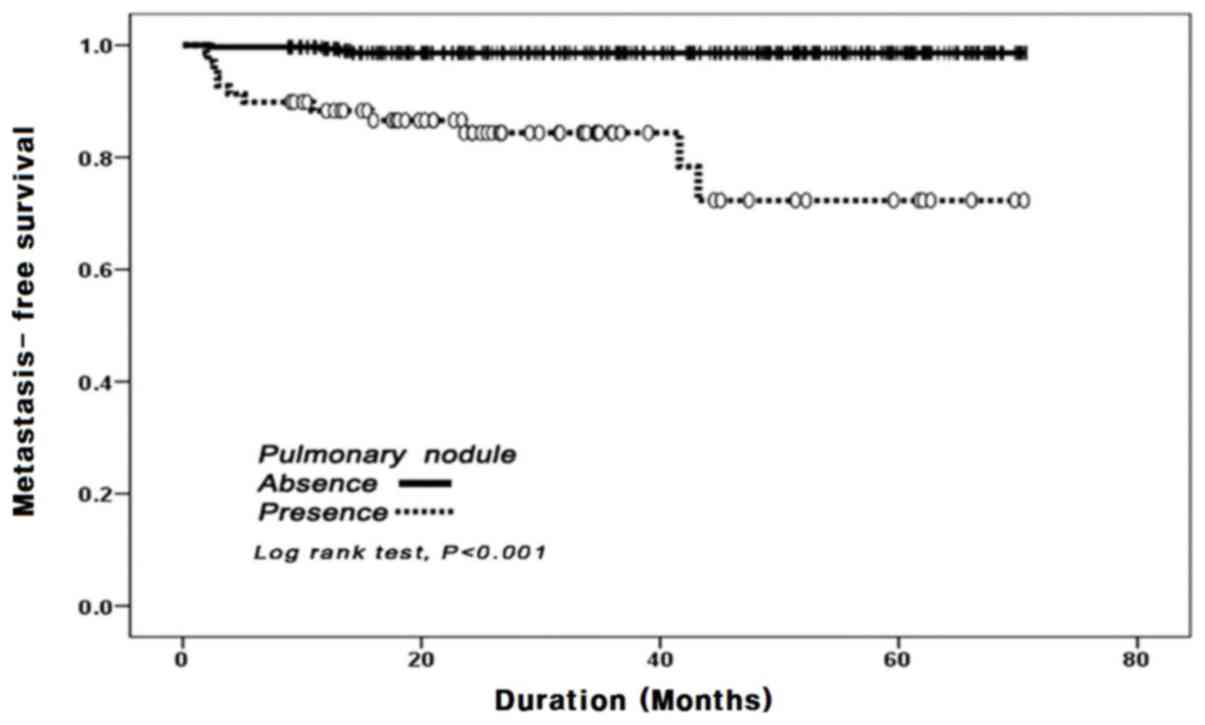|
1
|
Kummerlin IP, ten Kate FJ, Wijkstra H, de
la Rosette JJ and Laguna MP: Changes in the stage and surgical
management of renal tumours during 1995–2005: An analysis of the
Dutch national histopathology registry. BJU Int. 102:946–951. 2008.
View Article : Google Scholar : PubMed/NCBI
|
|
2
|
Chang JS, Park YH, Ku JH, Kwak C and Kim
HH: Predicting factors for death from other causes in patients with
localized renal cell carcinoma. Korean J Urol. 53:18–22. 2012.
View Article : Google Scholar : PubMed/NCBI
|
|
3
|
Mano R, Vertosick E, Sankin AI, Chevinsky
MS, Larish Y, Jakubowski CD, Hötker AM, Hakimi AA, Sjoberg DD, Akin
O and Russo P: Subcentimeter pulmonary nodules are not associated
with disease progression in patients with renal cell carcinoma. J
Urol. 193:776–82. 2015. View Article : Google Scholar : PubMed/NCBI
|
|
4
|
Ljungberg B: The role of metastasectomy in
renal cell carcinoma in the era of targeted therapy. Curr Urol Rep.
14:19–25. 2013. View Article : Google Scholar : PubMed/NCBI
|
|
5
|
Bianchi M, Sun M, Jeldres C, Shariat SF,
Trinh QD, Briganti A, Tian Z, Schmitges J, Graefen M, Perrotte P,
et al: Distribution of metastatic sites in renal cell carcinoma: A
population-based analysis. Ann Oncol. 23:973–980. 2012. View Article : Google Scholar : PubMed/NCBI
|
|
6
|
Ueda K, Suekane S, Mitani T, Chikui K,
Ejima K, Suyama S, Nakiri M, Nishihara K, Matsuo M and Igawa T:
Spontaneous regression of multiple pulmonary nodules in a patient
with unclassified renal cell carcinoma following laparoscopic
partial nephrectomy: A case report 5. Mol Clin Oncol. 5:49–52.
2016. View Article : Google Scholar : PubMed/NCBI
|
|
7
|
Phua CK, Sim WY, Sen Tee K, Lew SJ, Lim
AY, Tai DY, Goh SK, Kor AC, Ng AW, Abisheganaden J and Verma A:
Evaluation of pulmonary nodules in Asian population. J Thorac Dis.
8:950–957. 2016. View Article : Google Scholar : PubMed/NCBI
|
|
8
|
Field JK, Marcus MW and Oudkerk M: Risk
assessment in relation to the detection of small pulmonary nodules.
Transl Lung Cancer Res. 6:35–41. 2017. View Article : Google Scholar : PubMed/NCBI
|
|
9
|
Griffin N, Gore ME and Sohaib SA: Imaging
in metastatic renal cell carcinoma. AJR Am J Roentgenol.
189:360–370. 2007. View Article : Google Scholar : PubMed/NCBI
|
|
10
|
Khokhar S, Vickers A, Moore MS, Mironov S,
Stover DE and Feinstein MB: Significance of non-calcified pulmonary
nodules in patients with extrapulmonary cancers. Thorax.
61:331–336. 2006. View Article : Google Scholar : PubMed/NCBI
|
|
11
|
Donat SM, Diaz M, Bishoff JT, Coleman JA,
Dahm P, Derweesh IH, Herrell SD III, Hilton S, Jonasch E, Lin DW,
et al: Follow-up for clinically localized renal neoplasms: AUA
Guideline. J Urol. 190:407–16. 2013. View Article : Google Scholar : PubMed/NCBI
|
|
12
|
MacMahon H, Austin JH, Gamsu G, Herold CJ,
Jett JR, Naidich DP, Patz EF Jr and Swensen SJ: Fleischner Society:
Guidelines for management of small pulmonary nodules detected on CT
scans: A statement from the Fleischner Society. Radiology.
237:395–400. 2005. View Article : Google Scholar : PubMed/NCBI
|
|
13
|
Adibi M, Kenney PA, Thomas AZ, Borregales
LD, Nogueras-Gonzalez GM, Wang X, Devine CE, Karam JA and Wood CG:
Prediction of pulmonary metastasis in renal cell carcinoma patients
with indeterminate pulmonary nodules. Eur Urol. 69:352–360. 2016.
View Article : Google Scholar : PubMed/NCBI
|
|
14
|
Mouracade P, Kara O, Maurice MJ, Dagenais
J, Malkoc E, Nelson RJ and Kaouk JH: Patterns and predictors of
recurrence after partial nephrectomy for kidney tumors. J Urol.
197:1403–1409. 2017. View Article : Google Scholar : PubMed/NCBI
|
|
15
|
Katz MD, Serrano MF, Humphrey PA, Grubb RL
III, Skolarus TA, Gao F and Kibel AS: The role of lymphovascular
space invasion in renal cell carcinoma as a prognostic marker of
survival after curative resection. Urol Oncol. 29:738–744. 2011.
View Article : Google Scholar : PubMed/NCBI
|
|
16
|
Abel EJ, Margulis V, Bauman TM, Karam JA,
Christensen WP, Krabbe LM, Haddad A, Golla V and Wood CG: Risk
factors for recurrence after surgery in non-metastatic RCC with
thrombus: A contemporary multicentre analysis. BJU Int.
117:E87–E94. 2016. View Article : Google Scholar : PubMed/NCBI
|
|
17
|
Adamy A, Chong KT, Chade D, Costaras J,
Russo G, Kaag MG, Bernstein M, Motzer RJ and Russo P: Clinical
characteristics and outcomes of patients with recurrence 5 years
after nephrectomy for localized renal cell carcinoma. J Urol.
185:433–438. 2011. View Article : Google Scholar : PubMed/NCBI
|
|
18
|
Sun M, Shariat SF, Cheng C, Ficarra V,
Murai M, Oudard S, Pantuck AJ, Zigeuner R and Karakiewicz PI:
Prognostic factors and predictive models in renal cell carcinoma: A
contemporary review. Eur Urol. 60:644–661. 2011. View Article : Google Scholar : PubMed/NCBI
|
|
19
|
Xu R, Horick N, McGovern FJ, Dahl DM,
Feldman AS, Blute ML, Olumi AF and Michaelson MD: Prognostic
significance of indeterminate lung nodules in renal cell carcinoma.
Urol Oncol. 32:355–361. 2014. View Article : Google Scholar : PubMed/NCBI
|
|
20
|
Chen Z, Shao Y, Wang K, Cao W, Xiong Y, Wu
R, Luo S, Xu X and He X: Prognostic role of pretreatment serum
albumin in renal cell carcinoma: A systematic review and
meta-analysis. Onco Targets Ther. 9:6701–6710. 2016. View Article : Google Scholar : PubMed/NCBI
|
|
21
|
Bauer J and Capra S: Comparison of a
malnutrition screening tool with subjective global assessment in
hospitalised patients with cancer-sensitivity and specificity. Asia
Pac J Clin Nutr. 12:257–260. 2003.PubMed/NCBI
|
|
22
|
McMillan DC, Watson WS, O'Gorman P,
Preston T, Scott HR and McArdle CS: Albumin concentrations are
primarily determined by the body cell mass and the systemic
inflammatory response in cancer patients with weight loss. Nutr
Cancer. 39:210–213. 2001. View Article : Google Scholar : PubMed/NCBI
|
|
23
|
Henschke CI, Yankelevitz DF, Naidich DP,
McCauley DI, McGuinness G, Libby DM, Smith JP, Pasmantier MW and
Miettinen OS: CT screening for lung cancer: Suspiciousness of
nodules according to size on baseline scans. Radiology.
231:164–168. 2004. View Article : Google Scholar : PubMed/NCBI
|
|
24
|
Gould MK, Fletcher J, Iannettoni MD, Lynch
WR, Midthun DE, Naidich DP and Ost DE: American College of Chest
Physicians: Evaluation of patients with pulmonary nodules: When is
it lung cancer? ACCP evidence-based clinical practice guidelines
(2nd edition). Chest. 132 (3 Suppl):108S–130S. 2007.
|
|
25
|
Callister ME and Baldwin DR: How should
pulmonary nodules be optimally investigated and managed? Lung
Cancer. 91:48–55. 2016. View Article : Google Scholar : PubMed/NCBI
|
|
26
|
Benjamin MS, Drucker EA, McLoud TC and
Shepard JA: Small pulmonary nodules: Detection at chest CT and
outcome. Radiology. 226:489–493. 2003. View Article : Google Scholar : PubMed/NCBI
|
|
27
|
Sobin LH, Gospodariwicz M and Wittekind C:
TNM classification of malignant tumors. UICC International Union
Against Cancer. 7th. Wiley-Blackwell; pp. 2552009
|


















